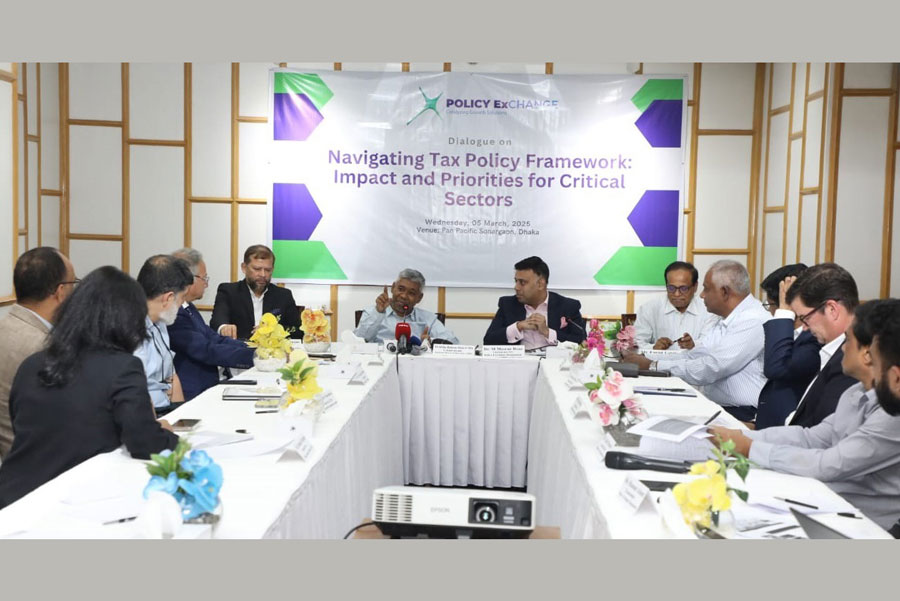
Published :
Updated :

Policymakers and industry leaders have called for a predictable and inclusive tax policy to ensure economic stability and sustainable revenue generation.
They made the call at a high-level dialogue on Wednesday while discussing the evolving taxation landscape and its implications for key sectors such as agro-processing, tobacco, energy, and FMCG.
The event, titled "Navigating Tax Policy Framework: Impact and Priorities for Critical Sectors," was hosted by Policy Exchange Bangladesh.
Chairman of the National Board of Revenue (NBR) Abdur Rahman Khan, attending as the chief guest, said the government aimed to ensure a fair and effective tax system that supports economic growth while maintaining fiscal discipline.
"The objective of our tax policy is to create a balance between revenue generation and business growth. We acknowledge the concerns raised by industry leaders and will continue working towards a taxation framework that fosters investment, compliance, and long-term economic sustainability," Mr Khan added.
He emphasised that tax policies must evolve in response to changing economic realities and that stakeholder engagement remains an important part of the decision-making process.
Kamran T Rahman, President of MCCI, called for structured dialogue between policymakers and businesses before implementing significant tax policy changes.
He stressed that a sustainable taxation framework requires cooperation between the National Board of Revenue (NBR) and industries, as policy shifts without consultation lead to economic disruptions.
Monisha Abraham, Managing Director of British American Tobacco Bangladesh, said, “The cost of doing business for legitimate manufacturers in the country is increasing. At the same time, the imposition of excessive taxes is having a negative overall impact on business.
“The total excise burden in the tobacco sector has risen to 83 per cent, which is even higher than World Health Organization (WHO) recommended 75 per cent. As a result, a favorable environment is not being ensured for legal businesses. Therefore, a change in the tobacco tax policy is necessary.”
She said, “We want to see an increase in foreign investment. For that, a conducive environment is essential. Such an environment can be achieved through discussions with stakeholders on policy matters.”
Ms Abraham stated, “BAT is ready to assist the NBR in any reform initiatives. However, such reforms should be undertaken through discussions with stakeholders.”
Farid Uddin, a former NBR member and member of the NBR reform committee, said, “The committee has talked with various stakeholders. The information we found, we will uphold that to the public. A few recommendations from us will also be given to the NBR Chairman.”
Paul Holloway, Managing Director of JTI, stated that excessive taxation could drive the market toward illicit trade and ultimately reduce government revenue.
He stressed that Bangladesh’s tobacco industry has historically contributed to steady revenue growth, but the recent tax hikes risk reducing compliance and encouraging unregulated market activities.
Bangladesh's corporate tax rates, standing at 27.5 per cent, remain significantly higher than those of regional competitors such as Vietnam and Thailand, where rates are 20 per cent.
The speakers warned that such high corporate tax rates could discourage both foreign direct investment and local business expansion.
Ahsan Khan Chowdhury, Chairman of Pran-RFL Group, pointed out that high corporate taxes make Bangladesh less attractive for foreign investors and suggested that a competitive tax structure would stimulate economic growth.
Zakir Hossain, Associate Editor of Daily Samakal, said that whatever is done regarding the tax matter should be discussed with the stakeholders, as this will be beneficial for all.
Iqbal Chowdhury, Director and CEO of Lafarge Holcim Bangladesh Limited; Mahtab Uddin Ahmed, President of ICMAB; Debabrata Roy Chowdhury, Company Secretary and Head of Legal & Taxation at Nestlé Bangladesh Limited; and Md Ariful Hoque, Director General of the Bangladesh Investment Development Authority, also spoke at the event.


 For all latest news, follow The Financial Express Google News channel.
For all latest news, follow The Financial Express Google News channel.